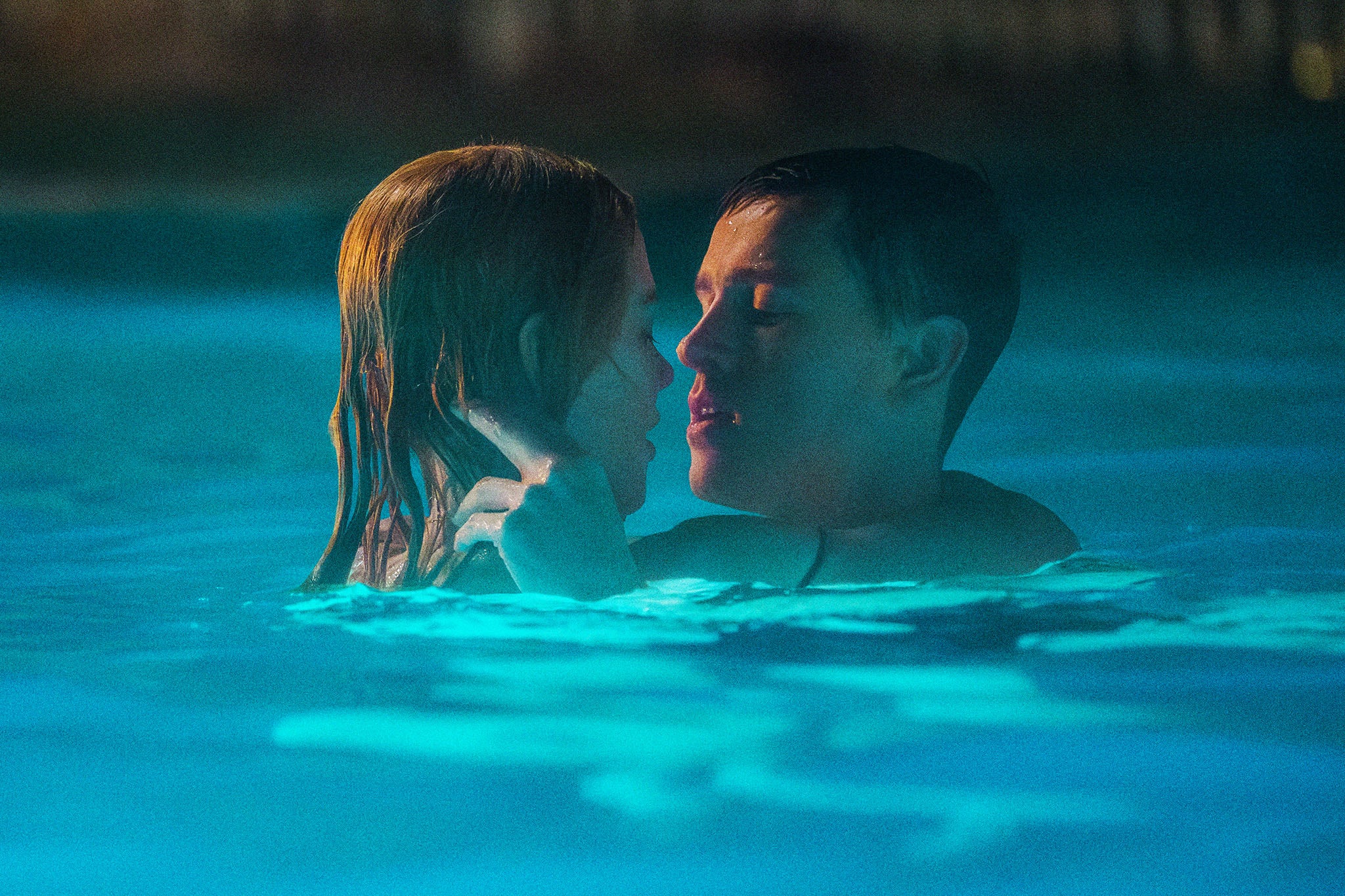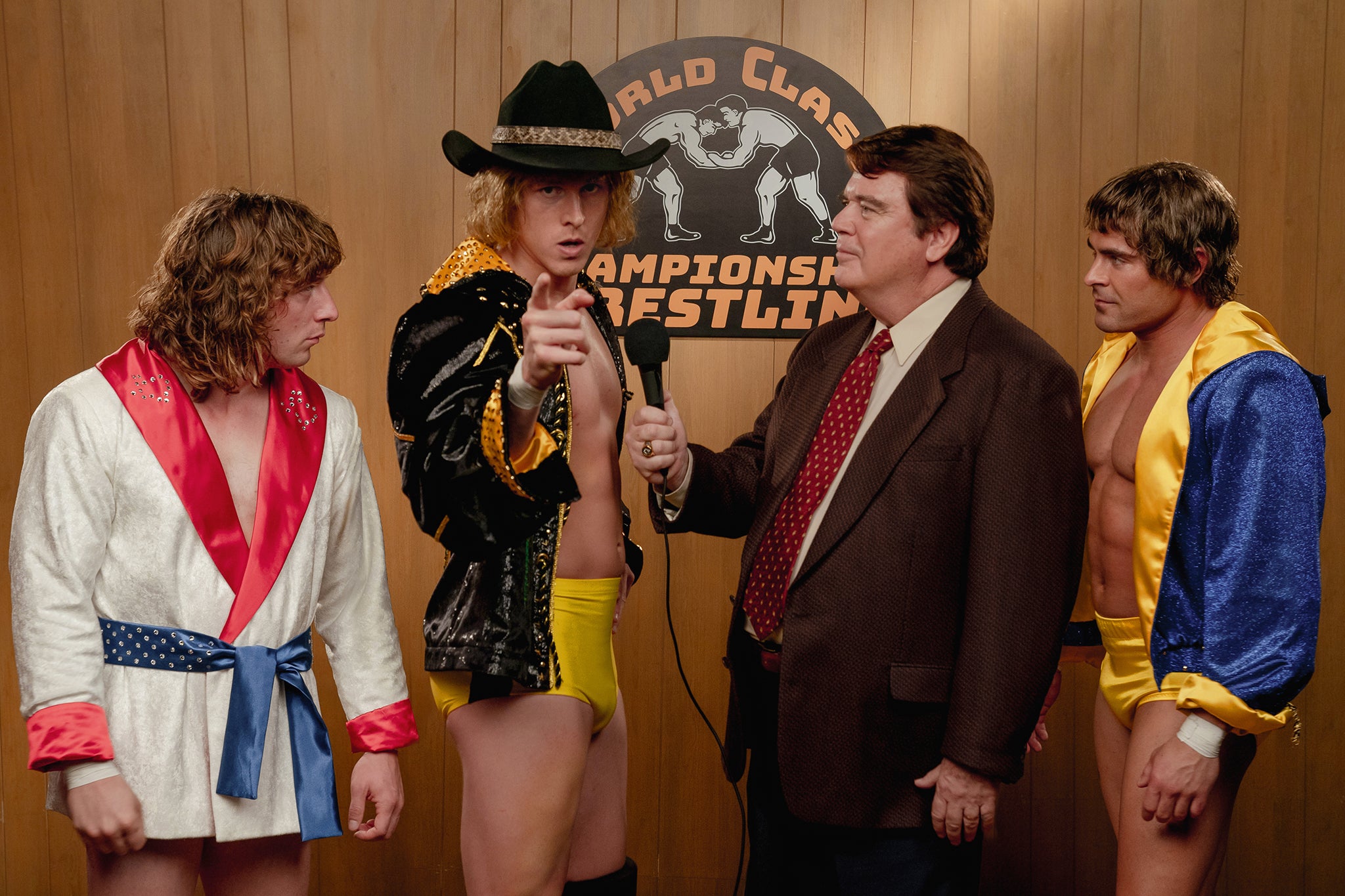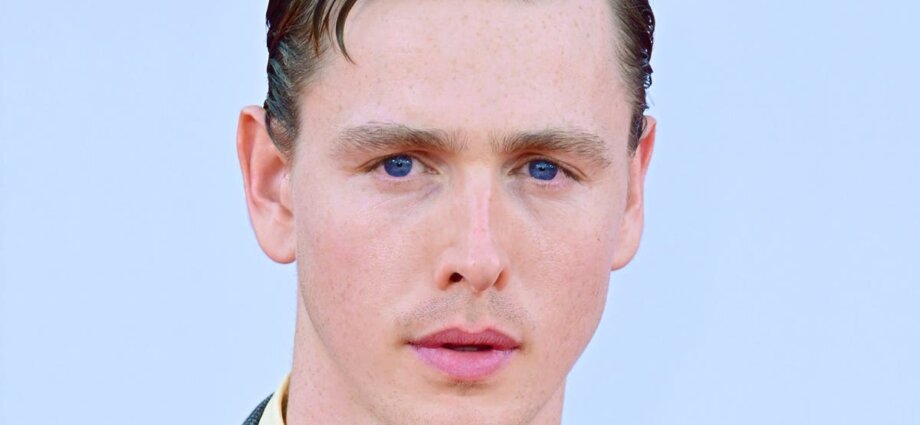Before he bossed her about and fed her dog biscuits, Harris Dickinson didn’t know much about Nicole Kidman. He knew her films, of course, but Kidman herself – the woman behind all that cryptic, porcelain, slightly alien elegance – seemed a bit removed on the set of their BDSM drama Babygirl. “We didn’t talk a load,” Dickinson says, lying prone across a hotel-room sofa. “We talked a lot about the characters we were playing. We didn’t talk about our personal lives, or our feelings.”
He and Kidman are close now, but it was (almost) all business while making Babygirl, a frisky, funny plunge into erotic chaos and sub-dom mechanics that’s now in cinemas. She had to play the perma-Botoxed tech CEO who can’t climax with her husband; he had to play the smirking intern who, like a randy telepath, senses in her a desperate urge to be treated like a very naughty girl who needs a good spanking. And it was hard!
Dickinson may be one of Britain’s most sought-after Hollywood exports – a wiry hunk with grit, humour and slippery vulnerability, whether it’s as the desperate supermodel of the satirical comedy Triangle of Sadness or the second fallen son of last year’s wrestling weepie The Iron Claw. But still: this is the Nicole Kidman. Acting royalty with a laundry list of bangers to her name. Dickinson respected the distance between them, not wanting to distract her from her process. But could he…? Just once…?
“Eventually I did ask, ‘What was it like working with Stanley Kubrick?’” Dickinson giggles, nervously. “Then another day would go by, and I’d say, ‘How was it with Lars von Trier?’ Then another would go by, and I’d say, ‘Sooo… Gus Van Sant, how was that?’”
Kidman was nice about it. She’d tell him stories. Entertain his fandom. Laugh. Then she’d get back to licking up milk from a bowl for him. “So yeah,” Dickinson grins. “I guess there were times when we allowed ourselves to be just two people chatting.”
Dickinson is 28 and handsome, with neatly lacquered hair, wide-leg, Fifties-style slacks, and his feet on the furniture. He speaks softly, sheepishly. When he swears, which isn’t often, there’s an apprehensive pause he makes beforehand, as if weighing up whether he’s allowed to. Meanwhile, Samuel, his character in Babygirl, is brazen, volatile, and a tiny bit outrageous – he lends the film its kick, its mischief. “I don’t have that swagger,” Dickinson says. “I’d like to have a bit more of it.”
We should probably talk about the sex. Babygirl is, inevitably, full of the stuff – not soft-lit, glamorous, Nineties-thriller sex, but charged, ungainly and guttural. Kidman crawls on her hands and knees, Dickinson thrusts about, Cristobal Tapia de Veer’s distorted, undulating score swirls and howls around them. “It’s choreography at the end of the day,” Dickinson says. “People see that stuff on film and they think it’s real, but it’s such a pre-planned, orchestrated thing. It has to be.”
There was, unsurprisingly, an intimacy coordinator on set, who primarily acted as a mediator between Kidman, Dickinson and their director Halina Reijn, the Dutch filmmaker behind 2022’s spicy slasher comedy Bodies Bodies Bodies. “I think as long as they don’t get in the way of the actual acting, and are just there to create an open dialogue and make everyone feel comfortable and safe, they’re really essential,” says Dickinson. “If you’ve got two people that feel scared and vulnerable, they’re not going to do great work.”
Kidman’s presence, too, was essential to his comfort. She arguably has the tougher job in the movie when it comes to the sex scenes – Dickinson stays clothed for the most part, and it’s Kidman’s character Romy whose sexual pleasure and self-discovery are most emphasised – but she held Dickinson’s hand through it all regardless. “She’s really brave with what she does,” he says. “She allows you to go to places and try things. There’s an openness to her, which was so important to the dynamic we had to create.”

Watch Apple TV+ free for 7 days
New subscribers only. £8.99/mo. after free trial. Plan auto-renews until cancelled

I tell him that I saw Babygirl at an early screening alongside a handful of other journalists, and that one left slightly appalled. They couldn’t bear seeing Kidman in such a way, I overheard them say, all debased and dominated. They found it disturbing. “No way!” Dickinson laughs. “That’s very on the nose in terms of what this film’s about.” He gets it, though. “It’s very confronting. It’s a bit provocative. And if you’re uncomfortable with it, maybe it speaks to what you’re potentially going through in terms of repression, right? It asks questions. But there are people that don’t want to watch cinema like that. They’re more interested in escapism, or going to something that is purely fantasy.”
Dickinson has largely avoided that kind of escapism so far. He’s part of a new breed of British and Irish male movie star – think, say, Paul Mescal or Joe Alwyn – that has focused on character dramas, auteurs and supporting roles. No capes! No smiling! The funny thing about Dickinson specifically, though, is that you can imagine his career having taken an alternative trajectory – one that might have been a lot more conventional and a lot less interesting. Luckily, no one saw those films.
“I don’t think anyone really knows I was in a Disney movie, or a [young adult] film,” he says. “Maybe that’s a good thing – not to throw shade.” There was The Darkest Minds in 2018, a Hunger Games-ish teen blockbuster that felt like an attempt to turn him into the next Liam Hemsworth. Then Maleficent: Mistress of Evil a year later, where he played pretty and princely to the camp scenery-chewing of Angelina Jolie and Michelle Pfeiffer.
They’re the only two of his films that can actually be watched by his young nieces, he says, so it all worked out, but they were products of a time when he was throwing everything at the wall. “They were opportunities to try something,” he remembers. “Like… I’m from east London, and you want me to play a Disney prince? OK, that’s not me at all, but yeah, all right, I’ll do a Disney prince. Why not?” It’s trial by error, he says. “I’ve been lucky that the things that have done well for me are the ones made by these really great auteurs that have particular visions. And that’s definitely what I’m more interested in.”

Besides, part of him didn’t have much of a choice back then. His first film was 2017’s Beach Rats, a rough-hewn, low-budget American indie about young queerness, which he booked from a self-taped audition recorded in his mum’s bedroom. He was 20, a product of bits of theatre and after-school performing-arts clubs in Highams Park, and was also working in the basement of a Hollister.
“To be very upfront about it, people who are in a privileged position can approach this stuff differently,” he says. “When I started working as an actor, I’d been working in a bar, I’d been picking up rubbish, working functions. And when you start getting jobs, you just work to work. It’s not until later that you have a bit more luxury to choose.
“We kind of avoid talking about it in our industry,” he continues. “If you’ve got financial or family support, you might be able to say that you’ll only do something that is absolutely high calibre. But not everyone has that capability.”
He remembers once working with an older actor who told him: “You have to do things only that you love” – it bothered him. “There are so many people in the world that don’t get to do a job that they love. They just have to work. So it’s a very privileged position to say, ‘Only do things you love.’ That doesn’t apply to many people.”
He’s aware that his life is different now, though, and that Babygirl is especially big. There’s even a scene in the film that feels like a proper arrival – Dickinson gliding shirtless into frame as he dances to George Michael’s “Father Figure”, while Kidman’s Romy gazes up at him awed from a hotel chair. You sense you’re watching a bonafide movie star. Or at least someone the internet will fall in love with once that shot is compressed into GIFs and memes. “When I’m 50 and have a big belly, I’m going to play that scene on repeat in the front room,” he jokes.
How comfortable is he, I ask, with rampant objectification? “Not very,” he says, fast. “That was a very quick answer. I mean, I’ll take it with the right filmmaker. I’m not really afraid of showing my body and stuff. I was raised to, you know, ‘love yourself, love your body, be proud of it’.”
He shifts on the couch, uneasy. I sense a “but” coming. “But I was a really chubby boy, right?” he says. “And I didn’t shed that until I was in my late teens. So I’ve always got that in my mind, and I don’t think that ever leaves you.” And now he’s playing models, wrestlers and objects of desire for sexually repressed marrieds. “Yeah, exactly,” he laughs. “And it feels kind of strange to me, because it’s not something I’ve been particularly used to… ‘being desired’.” He chews on those words; they seem to taste funny. “I’m happy to lean into it for the right film, but it’s not something I’m comfortable with.”
Does he think he has any long-term control over that, though? We’re chatting a few weeks before Christmas, in the midst of a run of “lookalike contests” in London, New York and Dublin, in which eager young men have congregated to fight for the title of “normie who looks the most like a current Hollywood pin-up”. There’s been a Paul Mescal lineup by this point, and one for Timothée Chalamet, and another for The Bear’s Jeremy Allen White – who played Dickinson’s brother in The Iron Claw.

“I mean, Jeremy is very sexy, so what are you gonna do?” he deadpans. “But it’s a bit weird. I think it’s fine as long as the conversation around it isn’t just about being desired. Like, Jeremy’s a phenomenal actor. And what a nice thing, to celebrate one’s looks, if he’s deserving of it. But I don’t imagine anyone wants to rest on that, or have their appearance be their sole currency. I think people want to be more than that.” He picks up his phone, rotating it between his fingers. “I guess some people don’t. Some people just want to be pretty, don’t they?”
Dickinson admits to maybe overthinking these kinds of things, about what it is to be successful, famous, attractive. “I’ve been acting for a minute now, but I still feel like I’m finding my feet,” he says. “I’m still figuring out what it is to be doing this. And there’s such a small pool of people that get to do this, so I’m always grateful for it.”
He puts his phone down onto the table between us, before apologising for fiddling with it.
“But I guess it has become my life now. Bit mad, isn’t it?”
‘Babygirl’ is in cinemas











